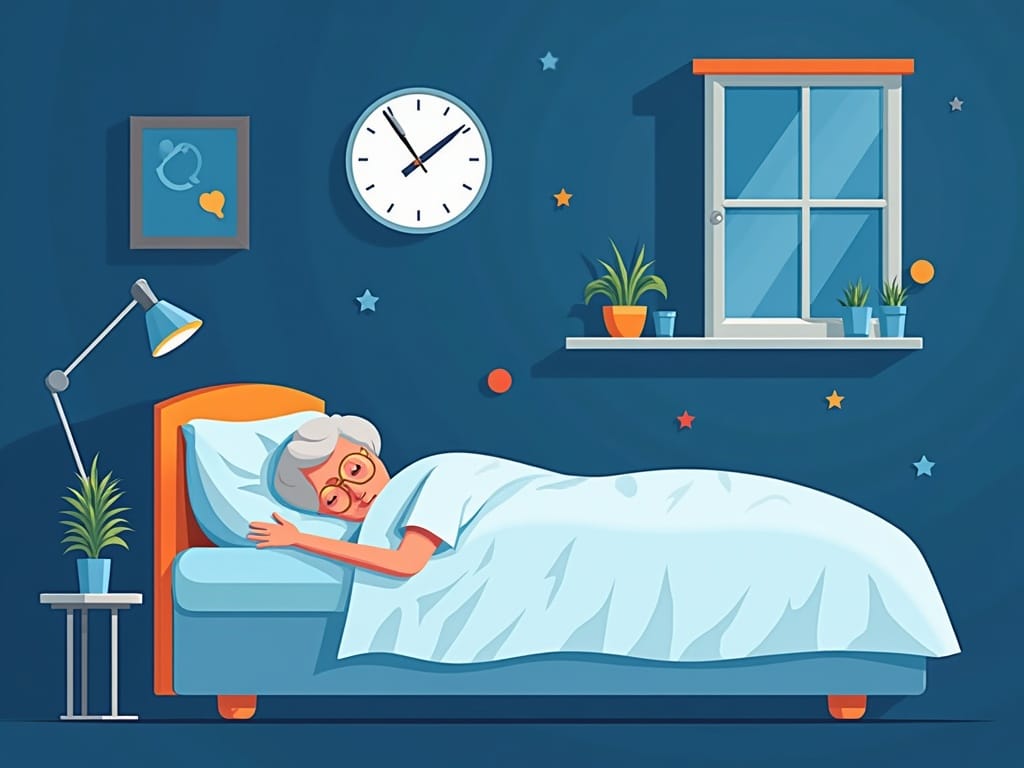Why Do Elderly People Sleep So Much? Understanding Sleep Patterns in Seniors
Have you ever noticed that your grandparents seem to spend more time napping than engaging in their favorite hobbies? Or perhaps you're an older adult yourself, finding the urge to sleep overwhelming at times. It's a common observation: elderly people often spend a significant portion of their day sleeping. But is this just a quirk of aging, or something more complex? Understanding the reasons behind increased sleep in the elderly is crucial for ensuring their well-being and quality of life.
The Changing Landscape of Sleep with Age
As we age, our bodies undergo numerous changes, and sleep is no exception. The sleep patterns of elderly individuals often differ significantly from those of younger adults. These changes can be attributed to a variety of factors, encompassing both physiological and environmental influences.
Shift in Circadian Rhythm
One of the primary changes is a shift in the circadian rhythm, the body's internal clock. This rhythm regulates the sleep-wake cycle, and as we age, it tends to advance. This means that older adults may feel sleepy earlier in the evening and wake up earlier in the morning, a phenomenon sometimes referred to as advanced sleep phase syndrome. It also contributes to daytime sleepiness.
Elderly Sleep Disorders: Understanding and Overcoming Sleep Challenges in Later Life
Decreased Sleep Efficiency
Another key factor is decreased sleep efficiency. This refers to the ratio of time spent asleep to time spent in bed. Older adults often experience more fragmented sleep, with frequent awakenings during the night. This can lead to a feeling of being unrested, even after spending what seems like a long time in bed.
Medical Conditions and Their Impact on Sleep
Underlying medical conditions frequently play a significant role in the sleep patterns of the elderly. Several common ailments can disrupt sleep and contribute to increased daytime sleepiness.
Chronic Pain
Chronic pain conditions, such as arthritis and back pain, are prevalent among older adults. Pain can make it difficult to fall asleep and stay asleep, leading to sleep deprivation and daytime fatigue.
Respiratory Problems
Respiratory issues like sleep apnea and chronic obstructive pulmonary disease (COPD) can also disrupt sleep. Sleep apnea, characterized by pauses in breathing during sleep, is particularly common and can lead to frequent awakenings and excessive daytime sleepiness.
Neurological Disorders
Neurological disorders such as Parkinson's disease and Alzheimer's disease can significantly impact sleep. These conditions can disrupt the brain's sleep-wake regulation mechanisms, leading to fragmented sleep and daytime sleepiness.
Medications
It's also crucial to consider the role of medications. Many medications commonly prescribed to older adults, such as diuretics, antidepressants, and beta-blockers, can interfere with sleep. It's very important to consult with a healthcare professional.
Lifestyle Factors Influencing Sleep in the Elderly
Beyond physiological and medical factors, lifestyle choices can also influence the sleep patterns of elderly individuals.
Reduced Physical Activity
A sedentary lifestyle can contribute to poor sleep. Regular physical activity can promote better sleep quality, but many older adults become less active due to physical limitations or other reasons.
Dietary Habits
Dietary habits can also play a role. Consuming caffeine or alcohol close to bedtime can disrupt sleep, as can eating heavy meals.
Social Engagement
Lack of social interaction and isolation can also contribute to sleep problems. Social engagement can promote mental and emotional well-being, which can, in turn, improve sleep.

Differentiating Between Normal Aging and Problematic Sleepiness
It's important to distinguish between normal age-related changes in sleep and excessive sleepiness that may indicate an underlying problem. While it's common for older adults to experience some changes in their sleep patterns, excessive daytime sleepiness and frequent napping could be signs of a more serious issue.
When to Seek Medical Advice
If an elderly individual is experiencing excessive daytime sleepiness, difficulty staying awake during activities, or frequent awakenings during the night, it's important to seek medical advice. A healthcare professional can evaluate the individual's sleep patterns, identify any underlying medical conditions, and recommend appropriate treatment options.
Strategies for Improving Sleep Quality in Seniors
Fortunately, there are several strategies that can help improve sleep quality in the elderly. These strategies encompass lifestyle modifications, medical treatments, and environmental adjustments.
Establish a Regular Sleep Schedule
Maintaining a consistent sleep schedule, even on weekends, can help regulate the body's circadian rhythm and improve sleep quality.
Create a Relaxing Bedtime Routine
A relaxing bedtime routine, such as taking a warm bath, reading a book, or listening to calming music, can help prepare the body for sleep.
Optimize the Sleep Environment
Creating a comfortable sleep environment that is dark, quiet, and cool can also promote better sleep.
Increase Physical Activity
Regular physical activity, such as walking or swimming, can help improve sleep quality, but it's important to avoid exercising too close to bedtime.
Manage Underlying Medical Conditions
Effectively managing underlying medical conditions, such as pain, respiratory problems, and neurological disorders, can also improve sleep.
Medication Review
Reviewing medications with a healthcare professional to identify any potential sleep-disrupting side effects is critically important.
Light Exposure
Ensuring adequate exposure to natural light during the day can help regulate the circadian rhythm.
The Importance of Addressing Sleep Issues
Addressing sleep issues in the elderly is crucial for their overall health and well-being. Poor sleep can have a significant impact on cognitive function, mood, and physical health. Adequate sleep, on the other hand, supports memory consolidation, emotional regulation, and physical recovery. In short, prioritize quality of life.
By understanding the reasons behind increased sleep in the elderly and implementing strategies to improve sleep quality, we can help ensure that older adults enjoy restful nights and productive days. Because ultimately, quality sleep for seniors is an investment in their independence, happiness, and overall vitality in their golden years.

